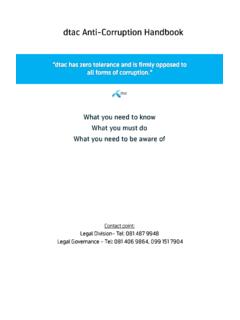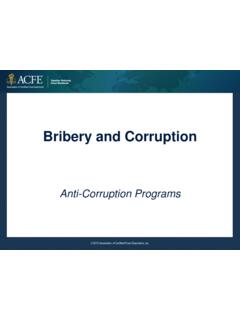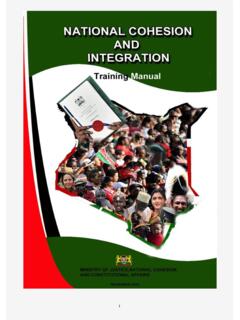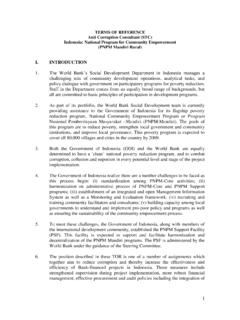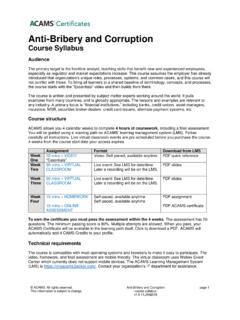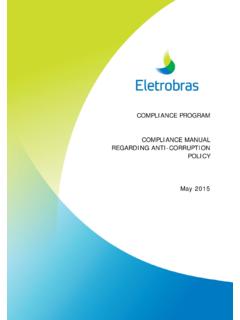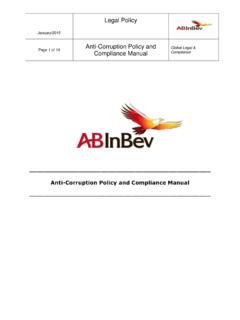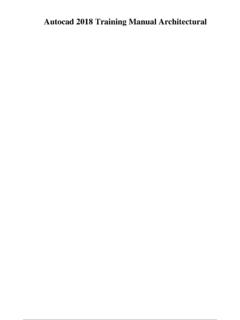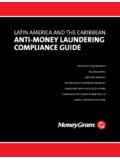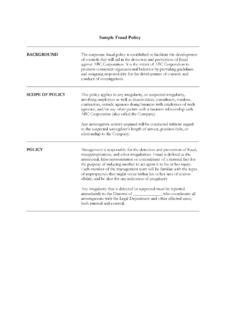Transcription of WHISTLEBLOWING IN GHANA TRAINING MANUAL
1 WHISTLEBLOWING IN GHANATRAINING MANUAL FOR CIVIL SOCIETY ORGANISATIONSAND TRADITIONAL AUTHORITIES REVISED EDITIONWHISTLEBLOWING IN GHANATRAINING MANUAL FOR CIVIL SOCIETY ORGANISATIONS AND TRADITIONAL AUTHORITIES REVISED EDITIONPig Farm Junction (Main Olusengun Obasanjo Way)P. O. Box GP 17921, Accra - GhanaTel: +233 30 22 304 83 Fax: +233 30 22 304 90 Email: anti - corruption CoalitionFirst Printed in May 2010 Copyright GHANA anti - corruption Coalition, May, 2012 All right reservedNo part of this publication may be reproduced, in part or whole, stored in a retrieval system, or transmitted, in any form or by any means, electronic, mechanical, photocopying, recording, or otherwise, without prior permission of the publisherISBN: 978-9988-1-3770-0 GHANA anti - corruption COALITION WHISTLE BLOWING IN GHANA TRAINING MANUAL FOR CIVIL SOCIETY ORGANISATIONS1 Table of ContentLIST OF ACRONYMS5 PREFACE6 ABOUT THE MANUAL7 PART 1: GETTING STARTED10 MODULE 1: BUILDING A CONDUCIVE LEARNING ATMOSPHERE11 Activity 1: Introduction of Participants11 Activity 2: Setting Ground Rules11 Activity 3: Mapping Expectations12 Activity 4.
2 Programme Content12 Activity 5: Pre-Workshop Evaluation13 Activity 6: Welcome and Remarks13 PART TWO: WHISTLEBLOWING14 MODULE 14 INTRODUCTION TO WHISTLEBLOWING14 Activity 1: Understanding Whistleblowing14 Activity 2: Importance of Whistleblowing14 Activity 3: Mechanisms for Whistleblowing15 Activity 4: Conditions Necessary for Effective Whistleblowing16 PART THREE: THE WHISTLEBLOWERS ACT 2006 (ACT 720)17 MODULE 1: GENERAL OVERVIEW OF THE WHISTLEBLOWERS ACT17 Activity 1: Understanding Corruption17 Activity 2: Importance of the Act in Combating corruption in Ghana18 Activity 3: General overview of the Act18 MODULE 2: DEFINING THE WHISTLEBLOWER?18 Activity 1: Who is a Whistleblower?18 Activity 2: The Whistleblower versus the Informant20 MODULE 3: PROCEDURES FOR MAKING DISCLOSURES21 Activity1: Receiving a Disclosure of Impropriety21 Activity 2: Action by Persons after Receipt of Disclosure21 Activity 3: Confidentiality of the Disclosure22 MODULE 4: PROTECTING THE WHISTLEBLOWER24 Activity 1: Understanding victimization?
3 24 Activity 2: Protection Mechanisms for Whistleblowers24 Activity 3: Who provides Protection for Whistleblowers?25 MODULE 5: REWARDING THE WHISTLEBLOWER27 Activity 1: Establishment of the Whistleblower Reward Fund27 Activity 2: Management of the Fund28 Activity 3: Payment of Rewards to Whistleblowers28 MODULE 6: THE MEDIA AND WHISTLEBLOWING IN GHANA29 Activity 1: Role of the Media29 Activity 2: Working with the Media30 MODULE 7: ROLE OF CSOS AND TRADITIONAL AUTHORITIES31 Activity 1: Receiving a Disclosure of Impropriety31 Activity 2: Assisting the Whistleblower to report to other Authorities31 Activity 3: Confidentiality of the Whistleblower32 Activity 4: Protecting the Whistleblower32 MODULE 8: CHALLENGES OF IMPLEMENTATION OF THE WB ACT33 Activity 1: Challenges of CSOs33 Activity 2: Challenges of Chiefs and Elders33 Activity3: Challenges of Head of Family and Religious Leaders34 Activity 4: General Challenges of Implementation of the Act34 PART 4: CLOSING SESSION36 MODULE 1.
4 CLOSING AND EVALUATION37 Activity 1: Post Workshop Evaluation37 Activity 2: Official Closing37 REFERENCES38 GHANA anti - corruption COALITION WHISTLE BLOWING IN GHANA TRAINING MANUAL FOR CIVIL SOCIETY ORGANISATIONS2 GHANA anti - corruption COALITION WHISTLE BLOWING IN GHANA TRAINING MANUAL FOR CIVIL SOCIETY ORGANISATIONS3 List of AcronymsA-GAttorney-GeneralCBOsCommunity Based OrganizationsCEOC hief Executive OfficerCSOsCivil Society OrganizationsCHRAJC ommission for Human Rights and Administrative JusticeGACCG hana anti - corruption CoalitionIGPI nspector-General of PoliceILOI nternational Labor OrganizationPNDCLP rovisional National Defence Council LawUKUnited KingdomGHANA anti - corruption COALITION WHISTLE BLOWING IN GHANA TRAINING MANUAL FOR CIVIL SOCIETY ORGANISATIONS4 PrefaceThe role of Civil Society Organizations (CSOs) in the fight against corruption is very immense.
5 They provide research, advocacy and public education that simplifies the complex issues of corruption to the ordinary person. CSOs further provide the first contact at the local and district Level for information to the public. On the other hand, the public needs to be well informed about the processes and procedures to blow the whistle and how to handle themselves during the period of making complaint to investigations and the final GHANA anti - corruption Coalition (GACC) developed the first edition of the MANUAL titled Whistle blowing in GHANA : TRAINING MANUAL for Civil Society Organizations (the MANUAL ) in May 2010. Its development was partly in recognition of the role that CSOs play in combating corruption in the country. The MANUAL was therefore meant to provide CSOs with the necessary tools to educate and sensitize the public on how, when and where to blow the whistle.
6 Further, CSOs knowledge on the Whistleblower Act 2006 will bridge the gap in information flow to ordinary citizens where public institutions are not found at the local first edition of the MANUAL was developed as a contribution to building the capacity of CSOs and Community-Based Organizations (CBOs) in raising awareness of the Whistleblower Act 2006 (Act 720) in particular and corruption in general. Following recommendations to assist other key stakeholders such as the Traditional Authorities, who are designated persons to receive and process whistleblower complaints or disclosures, the GACC convened an experts meeting to consider the proposals. The MANUAL was reviewed in April 2012 and based on the feedback received at the meeting and GACC's own reflection; changes were made to the design and content of the MANUAL . The result of the process of review is this revised edition of the MANUAL WHISTLEBLOWING IN GHANA - TRAINING MANUAL FOR CIVIL SOCIETY ORGANISATIONS AND TRADITIONAL AUTHORITIES The TRAINING MANUAL will be used for a four (4) day intensive TRAINING programme where participants will go through exercises on various scenarios of whistle blowing to equip them with a deeper understanding of the Act.
7 It is expected that all those who go through the TRAINING using this MANUAL will utilize the information for grass-root education to strengthen and spread information on the Whistleblowers Act 2006. Ordinary readers could further use the book for their internal TRAINING for both private and public institutions to improve knowledge on whistle would like to express my thanks to the Open Society for West Africa (OSIWA) for their support to review the MANUAL for broader stakeholder education. I am also grateful to Mr. Charles Ayamdoo, Director, anti - corruption Department - CHRAJ for revising the F. DENNISEXECUTIVE SECRETARYGHANA anti - corruption COALITION MAY 2012 GHANA anti - corruption COALITION WHISTLE BLOWING IN GHANA TRAINING MANUAL FOR CIVIL SOCIETY ORGANISATIONS5 IntroductionThis is a MANUAL WHISTLEBLOWING IN GHANA - TRAINING MANUAL FOR CIVIL SOCIETY ORGANISATIONS AND TRADITIONAL AUTHORITIES.
8 It was developed by the GHANA anti - corruption Coalition (GACC) to assist CSOs and Traditional Leaders with the necessary tools to promote the implementation of the Whistleblower Act 2006 (Act 720).GACC is a cross-sectoral grouping of public, private and civil society organizations with the sole aim of building a national effort to confront the problem of corruption and to devise effective control envisions a corruption -free GHANA , where honesty, transparency, accountability and integrity are upheld. It seeks to achieve this through the concerted efforts of its membership and in collaboration with other stakeholders. The objectives of GACC include the following:lCoordinate the running of a wide-based platform capable of effectively tackling corruption issues within GHANA and the systems and structures to optimize information sharing and exchange. In furtherance of its objectives, it has produced a number of tools for combating corruption in GHANA , in general and for promoting transparency and accountability.
9 It produced an anti - corruption action plan, developed corruption and media monitoring indicators, published Guidelines on whistle blowing, among 2006, the Whistleblower Act (the Act) was passed. The Act seeks to encourage and enable persons disclose information that relates to unlawful, corrupt or other illegal conduct or practices in the country in the public interest. It provides for the manner in which disclosures may be made and to whom, and provides for the protection of whistleblowers who may be subjected to victimization as a result of blowing the whistle. Apart from state institutions and other public officers mandated under the Act to receive complaints from whistleblowers, a chief, the head or an elder of the family of the whistleblower and a head of a recognized religious organization, should receive and process whistleblower complaints as appropriate. Central to the implementation of the Act are CSOs and CBOs, who by the nature of their work and presence at the grassroots levels can raise awareness about the Act and support persons who may want to report impropriety.
10 Through their research, advocacy and public education CSOs can simplify the complex issues of corruption for dissemination to the ordinary person in their communities. Therefore, their contribution to the fight against corruption can be significant. Chiefs and elders (traditional leaders) also require support in order to play their role as designated persons to receive and process whistleblower two years of existence, it became obvious that the MANUAL needed to be revised to cover traditional leaders. The MANUAL has, therefore, been revised to assist CSOs, CBOs as well as traditional leaders organize TRAINING and other capacity building programmes on the Whistleblowers Act 2006 (Act 720). The Purpose of the ManualThe MANUAL outlines activities for four (4) days TRAINING which aims at providing CSOs, CBOs and Traditional Leaders with the necessary tools for planning, designing and conducting effective workshops and other capacity building MANUAL has been designed for use by both facilitators and participants.
